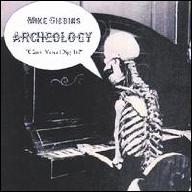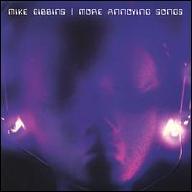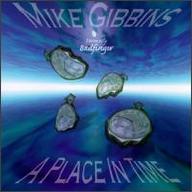In the late winter of 1965, when Gibbins was 16, an opportunity arose for him to move up to one of the more promising of the local bands on the Swansea music scene. The Iveys were a quartet led by guitarist/singer Pete Ham, and were starting to build a reputation around Swansea and get more and better gigs -- but their drummer, Terry Gleeson, had taken a new job in early 1965 that interfered with his availability. As a result, the group was in the market for a new drummer, and Iveys bassist Ron Griffiths met with Gibbins and invited him to audition. He passed, and joined at age 16. His youth notwithstanding, Gibbins was a strong drummer who gave the band a much more muscular sound; his style was similar to that of Ringo Starr of the Beatles, direct and unpretentious with a strong backbeat.
By 1966, the Iveys were a popular attraction on the London club scene, and they added the services of manager Bill Collins, who, among other things, encouraged them to compose their own material. Ham proved a remarkably gifted songwriter, authoring bold, infectious melodies and creating luminous harmonies in conjunction with bassist Tom Evans, who joined the lineup in 1967. While his bandmates explored composition, Gibbins learned piano and guitar. He also spent some time in hospital after a post-show road accident, losing his front teeth in the process.
He was with the Iveys from their early days of exposure, backing the singer David Garrick, through their initial contact with the Beatles' Apple Records and their signing in 1968, and then the long stretch of time from their abortive debut album (Maybe Tomorrow) to their name change to Badfinger, the latter coinciding with Griffiths' departure and Joey Molland's joining the band as lead guitarist (with Evans switching to bass). They broke through to the British and American Top Ten with the Paul McCartney-composed Come and Get It. The group followed this up in 1970 with their LP masterpiece No Dice, scoring a major hit with the crunching pop classic No Matter What. The album also featured the luminous ballad Without You, later covered by artists from Harry Nilsson to Mariah Carey. George Harrison produced much of the superb follow-up, Straight Up (with Todd Rundgren producing the remainder), and Gibbins and his bandmates returned the favor by playing on the former Beatle's solo masterpiece All Things Must Pass, and also serving as the backing unit at Harrison's Concert for Bangladesh.
But by 1973, amid the chaos that surrounded Apple's business and creative affairs, the band was ready to leave the label that had fostered its first flash of success. They were encouraged toward the door by their new manager, Stan Polley, who was eager to get them into a new contractual situation and alienated supporters like Harrison by negotiating a deal with Warner Bros. even as the band continued to work with Apple on a proposed new album. The result, when the smoke cleared, was that two new Badfinger albums showed up in stores within weeks of each other, Ass from Apple and Wish You Were Here from Warner Bros. It was an awkward situation for the band and a confusing one for its fans, which quickly turned into a debacle when it was discovered that Polley -- an infamously unscrupulous character -- had siphoned untold sums of money from the group's coffers, emptying an escrow account and forcing Warner Bros. to withdraw Wish You Were Here within weeks of its release.
Ironically, these should have been relatively heady days for Gibbins, who had begun writing songs by then, two of which -- Cowboy and You're So Fine -- turned up on their albums Ass and Wish You Were Here, respectively. Additionally, his singing voice had actually shown up on these records, and by rights the drummer should have been enjoying the limelight. That was far from the case for any of the bandmembers, however, as Polley had disappeared from view (and later disappeared, period), and their finances were in ruins, with even their Apple earnings lost in the hopelessly tangled business affairs of the soon-to-be-inactive Beatles label. Badfinger forged on, working on a new LP provisionally titled Head First. At least five of Gibbins' original songs were recorded at the sessions, but the album was shelved and was not released in any form until 2000. Gibbins left the band in late 1974 following a spat with Evans, and the rest of Badfinger's sad tale is well documented: a disconsolate Ham hung himself in 1975; Evans and Molland kept a version of the group going, intermittently, into the late '70s and early '80s; and after a violent argument with Molland, Evans likewise committed suicide in 1983.
Gibbins had remained busy doing occasional session work, including playing on Bonnie Tyler's hit It's a Heartache in 1978. He also worked on demos of his original songs, but a label deal was not forthcoming. Gibbins remained a respected session drummer, appearing on dates headlined by singers like Digby Richards and David Tipton before relocating to the south Florida area. In 1984 he joined Molland and latter-day Badfinger guitarist/keyboardist Bob Jackson as part of a tour celebrating the 20th anniversary of the British Invasion. Gibbins even made it to the Bottom Line in New York as part of a British Invasion revival package show that also included Billy J. Kramer and Gerry Marsden. The drummer also built a home recording studio and in 1998 issued his first solo record, A Place in Time. More Annoying Songs and In the Meantime followed, but on October 4, 2005, Gibbins died of natural causes at his home in Oviedo, Florida. He was 56. ~ Jason Ankeny & Bruce Eder, Rovi





















